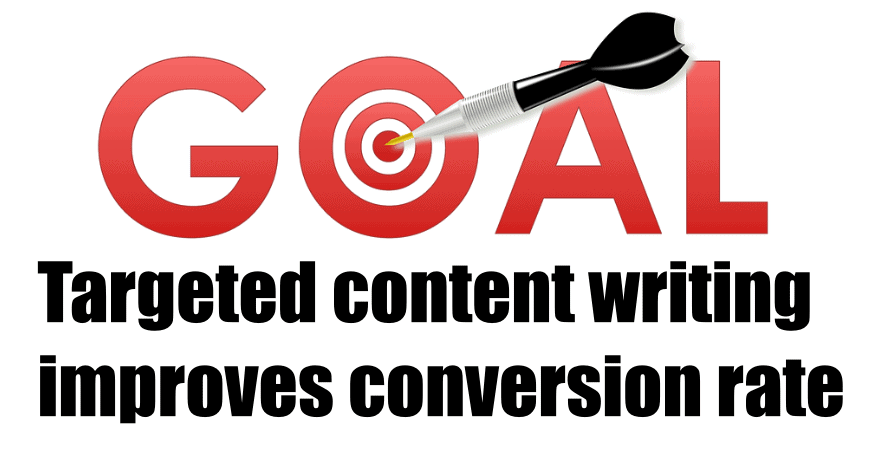You publish content to improve your conversion rate.
Conversion rate isn’t always about more people buying. It is about more people doing what you want them to do.
Suppose you write a blog post explaining people why they should download your e-book. This is your conversion rate – people downloading your e-book.
Although, you may want people to download your e-book so that they do business with you, the conversion rate of that particular link is the number of people downloading the e-book divided by the number of people accessing the link, multiplied by 100.
Targeted content writing plays an important role in this. The purpose of targeted content writing is to get the right people to your link and then delivering the right message.
Through targeted content writing, you need to tackle your conversion rate from two angles:
- Get traffic from search engines and social media/social networking websites.
- Convincingly deliver the message so that people take the action they’re supposed to take after reading your blog post or webpage.
How to do targeted content writing to improve your conversion rate
In simple terms:
- Clearly define what you want to achieve.
- Make a list of keywords and search terms that will help the right people to find your link on Google and other search engines.
- Write content based on these keywords but keep the message at the center.
Clearly defining what you want to achieve
Focusing on a single topic and a single objective is very important. Often, clients send me a topic and then they send me a long list of keywords to cover. It doesn’t work that way.
Sometimes they send me a list that has got nothing to do with the main topic title of the blog post or the web page they want me to write.
They simply want to generate search engine traffic without having a clear idea what the visitors are supposed to do once they find the link and come to the blog post or the web page.
Frankly, if you focus on your main topic (which generally has your main keyword or search term) you don’t need a separate list of keywords. Sure, you can use synonyms and alternative words for better SEO, but you shouldn’t move far away from your core topic.
I’m writing this blog post to explain to you how to do targeted content writing to improve your conversion rate. I don’t intend to teach you how to improve your SEO. I’m not even talking about copywriting.
To clearly define the purpose, know searcher’s intent and write accordingly.
For this blog post, I know that the searchers should be looking for a way to use content writing to improve their conversion rate. When they look for information on how they can use content writing to improve their conversion rate, I tell them that they should focus on targeted content writing instead of generic content writing.
Make a list of keywords that correspond with the information you are planning to provide
Keywords and search terms shouldn’t drive your writing effort. Nonetheless, they keep you focused and if you optimize your content writing for appropriate keywords and search terms, it helps the right people find your content on Google and elsewhere.
I say it again, don’t worry too much about using keywords everywhere. They should appear naturally. The more you focus on the topic, the better you optimize for the targeted keywords.
To write targeted content, as an experienced content writer, I can incorporate even unrelated keywords. Right now, I’m doing this for one of my clients. There is no connection with the topics they send me and the list of keywords they want me to focus on. Any other content writer would have either given up or made a mess of the entire thing. The client knows that I’m doing a great job.
Ideally, to write targeted content, make sure that the main search term appears in the title of the blog post or the web page you are writing. Various studies have shown that when people see the keyword or the search term they have just used, in the search listings, they click the link with greater frequency than those in search engine listings that don’t carry the keywords they have just used.
Remember that the most important is your message
Don’t bother about the keywords if you cannot incorporate them. There is always another blog post or webpage where you will be able to use those keywords. Most important is the information that you are providing. The value that you are delivering. Simply focus on that.
Your conversion rate depends on many factors. It also depends on the urgency the visitor has or does not have. But your targeted content writing plays a pivotal part. For that, you must know what you intend to achieve through your writing. Or your content writer.


